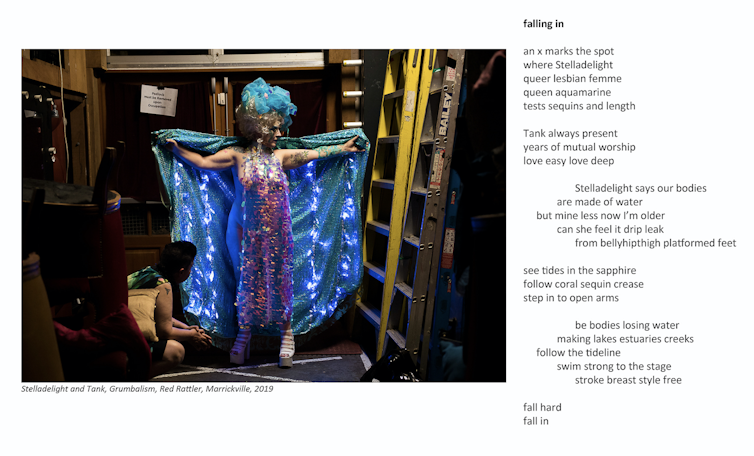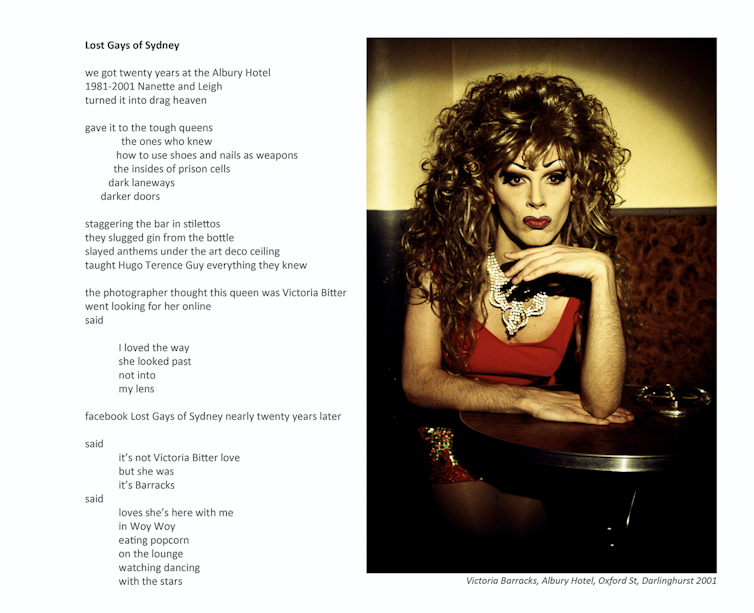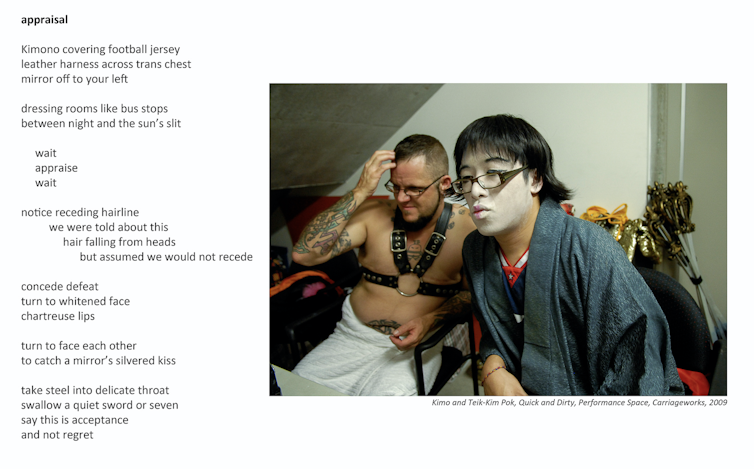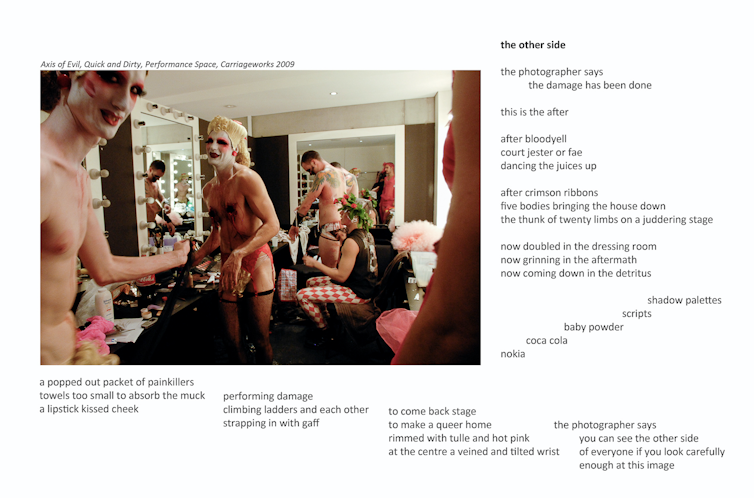An intimate, arresting exhibition highlights the hard work of living queer
- Written by Leigh Boucher, Senior Lecturer – Modern History, Macquarie University
Queerdom, an exhibition showing at the Imperial Hotel in Erksineville, is an arresting and unsettling archive of queer and trans performances in Sydney.
A collaboration between photographer Jamie James and poet Quinn Eades, working here as James Eades, Queerdom presents a history of sexual and gender transgression that refuses containment and comfort. Instead, these works ask much more probing questions about the hard work of living and performing on the sexual and gender margins.
The exhibition aims to present what the artists term a “queertrans” history, from the 1990s until today – this term is a deliberate attempt by the artists to put these identities, practices and experiences into productive dialogue with each other.
Each work pairs a photograph of a queer or trans (or both) performance with poetry. In one sense this is an exhibition about live performances; stages and performers at the Imperial in Erskineville, Performance Space in Redfern, the Albury Hotel in Paddington, and Tap Gallery in Darlinghurst loom large.
 ‘falling in’, image: Stelladelight and Tank, Grumbalism, Red Rattler, Marrickville 2019.
© Queerdom/James Eades
‘falling in’, image: Stelladelight and Tank, Grumbalism, Red Rattler, Marrickville 2019.
© Queerdom/James Eades
Implicitly, the exhibition delineates a historical geography of queer performance – of dissidence moving westward, as queer alternatives have been pushed from Darlinghurst and Surry Hills to Redfern, Erskineville and Marrickville by rising rents and the cultural homogenisation that so often accompanies them. That this exhibition is taking place at the Imperial is a reminder of how important and vulnerable those spaces can be.
We see “Glitta Supernova” leaning back on stage at Fetish Ball in 1996, screaming in delight as she sprays orange liquid, Berocca we are assured, over her audience – and not from her mouth. “What’s so terrifying about piss”, we are asked. And what might happen if we just “let ourselves taste it … could we just acquiesce?”
While this might be an exhibition about performance, words work in tandem and tension with these photographs to produce intimate accounts of life on the margins of the sexual and gender order more broadly. This exhibition has much to say about the emotional life of its subjects.
As any historian will tell you, archives are not simply repositories of data from the past – they are mediated representations of historical knowledge. This archive provokes and unsettles what we might expect to see in an exhibition about gender and sexuality, as we might well expect a queer project to do.
 ‘lost gays of Sydney’, image: Victoria Barracks, Albury Hotel, Oxford St, Darlinghurst, 2001.
© Queerdom/James Eades
‘lost gays of Sydney’, image: Victoria Barracks, Albury Hotel, Oxford St, Darlinghurst, 2001.
© Queerdom/James Eades
In one sense, Queerdom is a powerful riposte to the comforting narratives that abounded in the campaign for same-sex marriage and its aftermath. Leaders in this campaign, as well as the exhibitions shaped by its politics during the 2018 Mardi Gras, tended to mobilise a story in which sexual minorities were making the final steps towards love, happiness and acceptance.
The story works something like this: sexual minorities in the past were caught in the trap of socially imposed shame and loneliness, unable to express and manifest their sexual and gender identities in public. The hard work of activism since the 1970s, not least in projects that spoke the language of liberation and pride, has offered a route to happiness and love. Gay and lesbian life, we are so often told, is all about love and a happy, shining couple finally able to get married.
This intimate exhibition of exuberant and modest moments has more challenging and discomforting things to say.
We see Kimo and Teik-Kim Pok, backstage at Carriageworks during the performance series Quick and Dirty in 2009, looking tired and confused, one performer wrapped in a towel with furrowed brow, the other looking pensively into a mirror.
This is not the golden couple of marriage equality. These friends (or lovers, or maybe just performers):
turn to face each other / to catch a mirror’s silvered kiss / take steel into delicate throat / swallow a quiet sword or seven / say this is acceptance and not regret
 ‘appraisal’, image: Kimo and Teik-Kim Pok, Quick and Dirty, Performance Space, Carriageworks, 2009.
© Queerdom/James Eades
‘appraisal’, image: Kimo and Teik-Kim Pok, Quick and Dirty, Performance Space, Carriageworks, 2009.
© Queerdom/James Eades
Of course, some of the pieces here can be yoked to a story of pride and celebration. There is a heathy dose of queer fabulosity on display. Photographs abound of performances exploding with pleasure and the thrill of gender and sexual transgression, however the poetry works hard to force the viewer to think carefully about what they are seeing and the easy thrill they might get from the labour of others.
While some critics might suggest the inclusion of poetry alongside these photographs makes their meaning rigid, leaving less space for ambiguity, these words do precisely the opposite – they force you to stop, they ask you questions.
A photograph of the performance “Axis of Evil” at Carriageworks in 2009 captures the performers back stage, in the familiar setting of a mirror-filled and clothes-strewn dressing room. Sinewy arms protrude and make up runs down faces.
after crimson ribbons / five bodies bringing the house down / the thunk of twenty limbs on a juddering stage // now doubled in the dressing room / now grinning in the aftermath / now coming down in the detrius
 ‘the other side’, image: Axis of Evil, Quick and Dirty, Performance Space, Carriageworks 2009.
© Queerdom/James Eades
‘the other side’, image: Axis of Evil, Quick and Dirty, Performance Space, Carriageworks 2009.
© Queerdom/James Eades
Through the inclusion of moments offstage, Queerdom asks us to consider the emotional cost of living and performing in ways where the narrative destination might not be a happy couple with easily recognisable gender identities. These are moments on the edges of difference.
We see performers looking wrung out, collapsing into one and other while also looking uncertain about what these moments might mean.
Here, life looks exhilarating, but also exhausting. Living in ways that don’t conform to the stories we like to tell about gender, sexuality and intimacy isn’t just a struggle for recognition. It’s the struggle against the terms under which that recognition is proffered – the desperate work of trying to exist and thrive in ways that make others so very uncomfortable.
“You know they’re still saying we’re monsters”, James Eades points out in the poem “taking the coverings off”. Maybe a bit of unsettling monstrosity is what we should be working towards, even if it is sometimes terrifying and exhausting.
Queerdom is showing upstairs at the Imperial Hotel, Erskineville until June 30.
Authors: Leigh Boucher, Senior Lecturer – Modern History, Macquarie University





